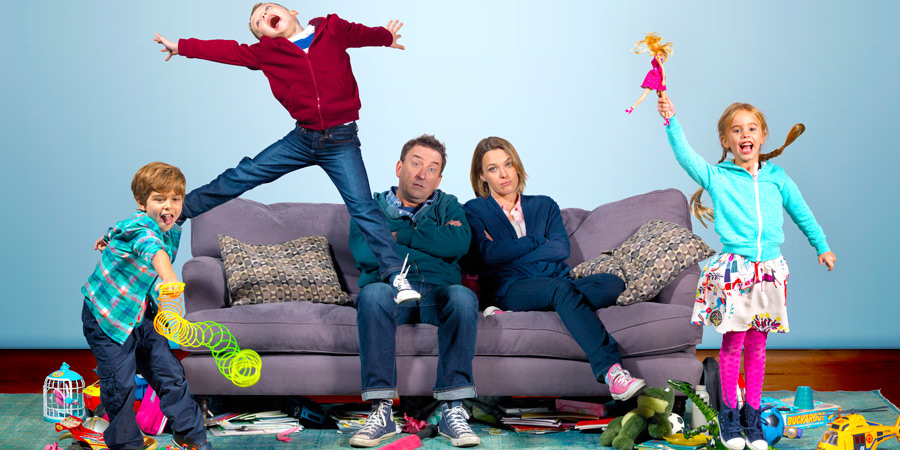Mav42
Tuesday 3rd March 2009 8:56am
Exeter
76 posts
A few have picked up on the "canned laughter" comment. It wasn't supposed to be insulting – it was just the most concise way of referring to the audience laughter in the given context. I appreciate that the laughter track in NGO is from live recordings.
Quote: Quentin @ March 2 2009, 8:47 PM GMT
Both of these points are quite interesting, because, in my opinion they are totally unfounded. The latter comment regarding so few jokes coming from character is, I believe, incorrect. A large proportion of the jokes do come from character, it is just that they are told in a set up and pay off style and that is why I feel you think this. It is the style of humour the show has chosen to use, and of course it is not going to appeal to everyone, but, that is when we all have to be objective and realise that you can't please all of the people, all of the time. There is no sitcom out there that can claim to please one and all. Quite often the humour comes from the characters' faults such as Barbara being clumsy, Tim being a wimp, Daisy being a little dim etc. but it is humourised through the gags. There are plenty of shows out there that get humour from character, such as something like Gavin and Stacey, which I also enjoy. A show such as Gavin and Stacey tend to avoid your typical gag set up, as such, and rely heavily on the humour coming from the individual characters. It's successful at it's style, just as Not Going Out is successful at it's style. It would be interesting to see just how many of the gags are based on character, perhaps during tonights repeat. I would say that a large proportion are. A lot of the humour also comes from the relationships between the characters with each other-something I think is important in sitcom, well, it is for me anyway.
Ultimately it depends on what you consider character humour to be. Stupidity, clumsiness and whichever side of the north-south divide you fall on do not, to me, represent character complexities but comedic functions: conventional sources from which the writers can draw fodder for jokes.
Character comedy is Frasier and Niles laughing uproariously at a notably weak joke from a respected opera aficionado as Martin looks on in the background, shaking his head. (For example).
Such a scene is rife with dramatic irony, ulterior motives, idiosyncrasies and established traits and attitudes – above all else, it has empathy.
However strong a joke about Tim being a wimp may be, it will only ever work on its own merit. To Tim or his plight, we are emotionally detached, and so is the case with the rest of the NGO ensemble.
As for the criticism that any serious conversations between characters, such as Lee and Lucy, are awkward and out of place amongst the gag heavy other 25 minutes of the show, I fear you may be missing the point. Serious conversations are able to be soft and subtle as they stand out even more as the pace changes from the rest of the show. For me, it often leads to adding to the depth as it is more touching when the characters behave in a way we don't often see. It is, however, always nice to then see them revert back to their old selves, having not learnt anything and not changing. I remember a scene from last series between Lee and Lucy in which Lee is pretending to chat Lucy up. After a few gags, Lee then turns serious resulting in a truely touching moment between the two characters only then to return to the gags. It's these twists and turns that I think add to the humour.
You suggest I'm missing the point because serious situations are made softer and more subtle by vividly contrasting the jaunty comedy that elsewhere takes precedence. I don't believe that's the case. To me, the effect is the opposite.
Only Fools and Horses could be as touching as it was funny because the serious bits weren't "bits" at all – rather natural progressions of plot and character; climactic points where already established relationships and stories would culminate as fluidly and eloquently as the big comic set-piece.
When it comes time in NGO for the wit and farce to subside; for the characters to feel vulnerable and act like normal human beings, it jars. It feels crowbarred in, as if they felt it was time for a bit of depth. Yet we barely know these people beyond a few shallow characteristics. With so little dramatic build-up, such scenes, however well written, inevitably fail to evoke what they should.
It baffles me as to how anyone could find the serious segments dramatically heightened when juxtaposed with the character-sacrificing, quick fire comedy they stand against. Nor do I feel it any form of writing triumph, as Aaron suggested, that I should be instilled with the same awkwardness the characters might be wrestling with on-screen. I shouldn't be cringing through scenes of such importance. I should care.

